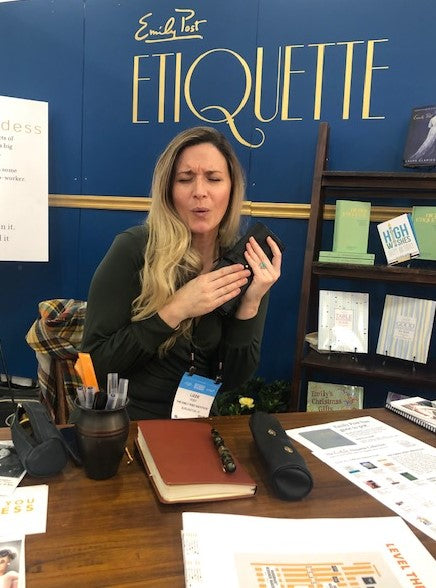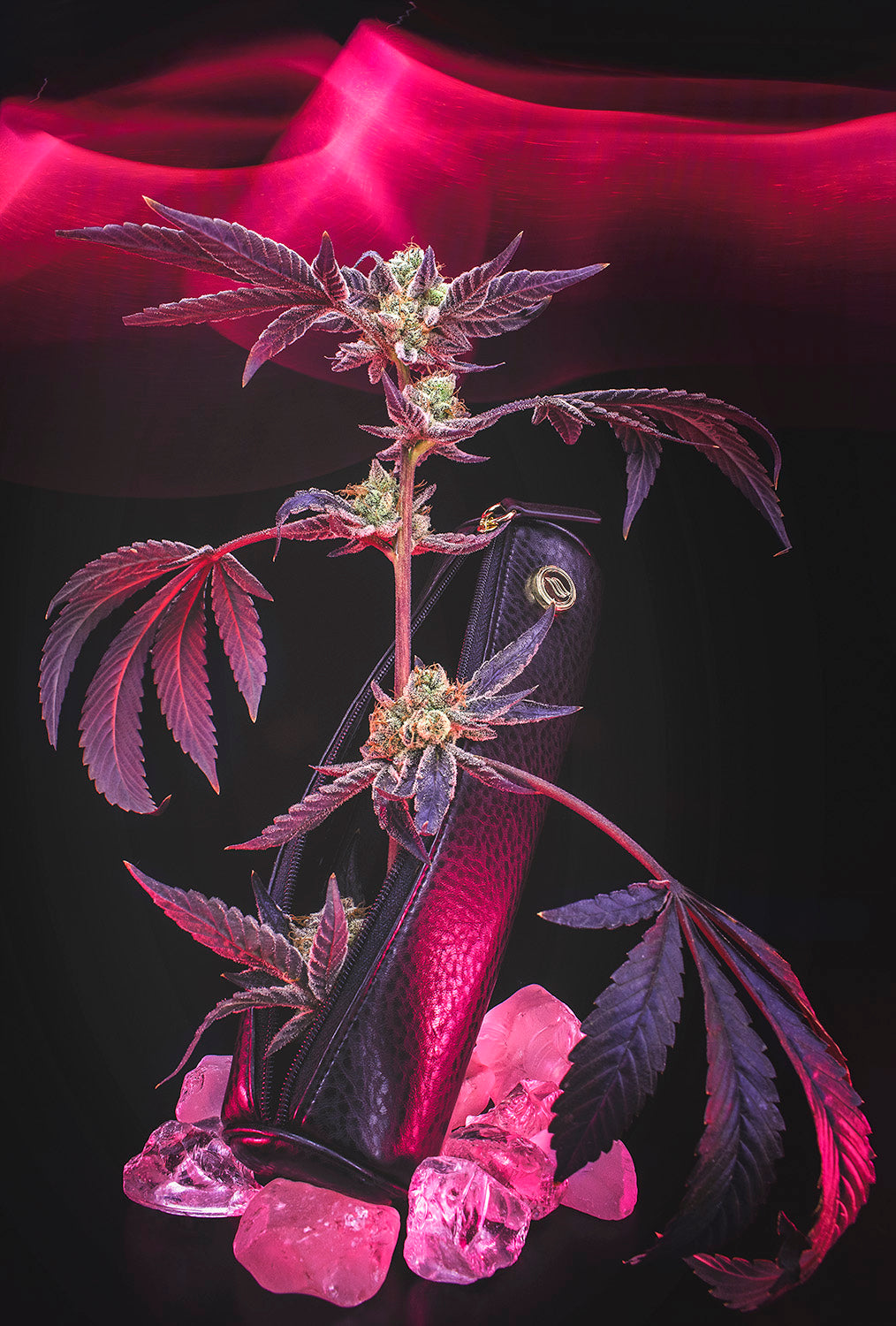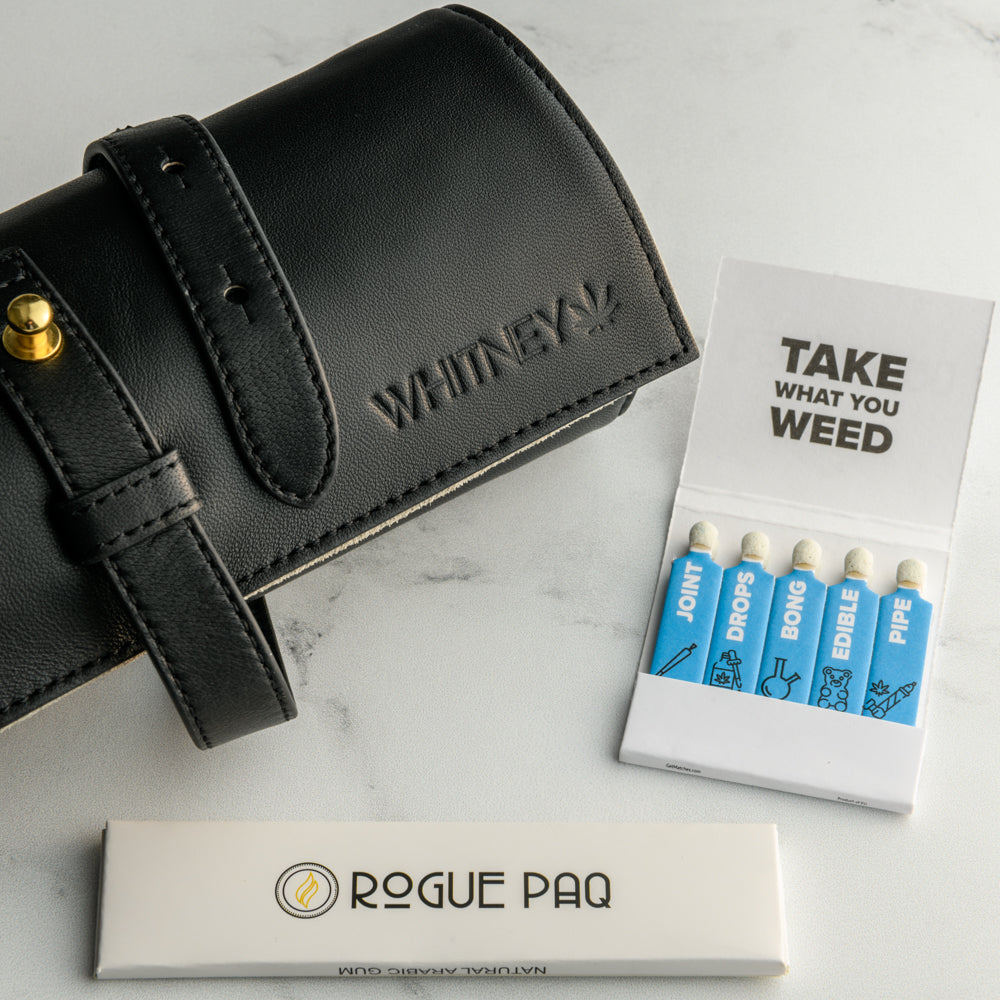
Canna Conversations: Lizzie Post, Author of Higher Etiquette
Photo cred: Rogue Paq
We had the extreme pleasure of chit chatting with the author of Higher Etiquette, Lizzie Post, whom we adore. She is a perfect example of a person who lives her mission. Her core values extend into every aspect of her life including how she interacts with cannabis. From experience and research, she passes along helpful tips on how to navigate the cannabis experience when it includes other people. The book is beautifully and thoughtfully considered, never preachy, and puts the emphasis on awareness and respect - for both others and the plant itself.
Rogue Paq (RP): What is the most taboo topic for which you have advised on etiquette and what was that advice?
Lizzie Post (LP): Honestly, almost nothing is too taboo to talk about and examine. Etiquette can really be a part of every conversation. But it’s fair to say that people are often timid about bringing forward questions relating to controversial issues like parenting, hate speech or personal issues like bodily functions, medical topics or sex. When approaching a topic that lacks widespread information or understanding, our mission is to start building language around the specific need and to look at who’s involved and how they are impacted and then find a way for everyone (hopefully) to feel safe and comfortable and included. Often our advice is subjective and focuses on the individual’s comfort level with a given situation. With a few exceptions, much of etiquette is about the individual figuring out how to both manage their comfort levels and boundaries and respect and consider those of others.
RP: We think your book Higher Etiquette is a genius way to make the very idea of etiquette modern again and relevant. Whose suggestion was it to write the book? Was there any backlash from your family’s institute?
LP: The topic was never taboo in our family. We are from VT so culturally there’s a lot of knowledge and acceptance regarding cannabis built-in. I grew up knowing families who engaged with it and I’m obviously a cannabis fan. So, the idea has been around at the institute for awhile now. I remember receiving my first cannabis related etiquette question pre-2014 asking about the etiquette of smoking on your stoop. That was interesting to us not especially because it was cannabis related but because it was about smoking in an illegal setting and people were willing to turn to Emily Post for the question. In terms of the politeness of the act, it’s about being aware of others and your surroundings. If you are infringing on another’s space (even with smell) etiquette would ask that you at the least recognize it with a “Sorry about the smoke” and hopefully to go further and try and do something to minimize the impact on those around you.
In terms of who suggested writing the book, someone I knew in the publishing world reached out directly to see if I knew anyone interested in penning a book on cannabis etiquette. I was all alone when I received this email and I realized I was raising my hand into the air. I was so excited at the prospect! It was very “dream coming true” for sure. The publisher was interested that we wanted to write the book not as me on my own but as an Emily Post Institute book. My family was thrilled, a few were a little nervous, but everyone could see the need and the potential for this book, if it was done well.
"When approaching a topic that lacks widespread information or understanding, our mission is to start building language around the specific need and to look at who’s involved and how they are impacted and then find a way for everyone (hopefully) to feel safe and comfortable and included."
RP: We believe that beauty and good design go a long way in breaking down stigmas around cannabis. We fell in love with the design of your book the moment we laid eyes upon it. Tell us about how that vision came together.
LP: The design of the book was super intentional and I’m incredibly grateful for the end result. The illustrator, Sam Kalda, and the publisher Ten Speed Press, especially designer Lizzie Allen, were incredible to work with. I really value the time and consideration with which Lizzie Allen pulled together all of the elements for the cover. She ensured that it remained modern and true to its content, yet also paid homage to the 100 year old brand that we are. It’s interesting because when we went to press, many perceived the book as fancy or uppity and were happy to find that it is more down to earth. There are books we read then immediately pass to others and there are books that we buy to keep and cherish and display. It was our intention to aim for the latter..

RP: If you had to let one piece of advice bubble up to the top from Higher Etiquette, what would it be?
LP: This isn’t relegated to cannabis only, but as a general rule a top piece of etiquette advice revolves around being aware: being self aware and also acutely aware of others, the environment, and circumstances that you find yourself in. Being aware solves most etiquette issues. For most etiquette situations, while taking the time to think through something first doesn’t actually take long in our brains (holding this door a little longer will help the person behind me - not a long thought at all but super etiquette-y), it’s getting into the habit of being willing to do it over and over and over again that helps.
RP: Given you are the famed Emily Post’s great great granddaughter, how early did you become aware of the value of etiquette and how did you first apply it meaningfully?
LP: My first real words as a toddler were “thank you.” (it came out tank-oo). I didn’t fully grasp their meaning but I’m sure I recognized it brought praise and attention each time I uttered it and so according to my mom, I waddled around saying it over and over. From the very beginning my mom always made it really fun to teach us manners. She used humor and play acting to make sure it wasn’t nagging and negative. For instance putting our napkins in our lap was called “sinking your sail.” So anytime we sat down to a meal she’d look over at my sister and me and say, “Girls, it’s time to sink your sail” (often in a mock-fancy voice) which never failed to make us giggle. And it made us remember our napkins!
RP: What was your process for accumulating content for Higher Etiquette? Did you survey a lot of folks or did you mainly draw upon personal experiences?
LP: It was a combination of both. I began by drawing on personal experience to determine what topics needed to be covered and then what kind of research and interviews I needed to conduct. When I began writing the book, cannabis was not yet legal in VT so there was a lot that went into getting a broad sampling of experiences, backgrounds, and perspectives often out of state. At Emily Post we try to have our finger on the pulse of society and really reflect what we are seeing and hearing in order to paint a broad and inclusive picture. We try to portray a reflection of what society is choosing as its standards instead writing a prescription for society’s standards. And in the case of this book, that meant looking not just at what cannabis had been but where it was heading too - dispensaries, products, gathering spaces, events. There was a lot to take on and explore. We couldn’t include it all in our page limit, but that just means more room to grow and explore more.
"...As a general rule a top piece of etiquette advice revolves around being aware: being self aware and also acutely aware of others, the environment, and circumstances that you find yourself in. Being aware solves most etiquette issues."
RP: What is your biggest cannabis pet peeve and what is your advice on it?
LP: I have a few, but they are pretty standard. The first is when the topic of cannabis comes up and someone in the conversation resorts to stereotypes or dismissive language. It’s fine to not use or like cannabis and it’s fine to say it doesn't work for you or you don’t agree with it, but it’s irritating to me to attack it with negativity. The second is that I cringe internally when someone pinches down too hard on the joint and all the stickiness of and any resin that’s built up then makes it hard to pull smoke from it. I want a smooth and easy inhale. The third is that I don’t like to be handed a joint with a long ash. Ash then pass. It’s not fun when there’s a long caterpillar ash that might land in your lap when the joint is passed to you. Clothing and couches lookout!
RP: What is your favorite book and why?
LP: I am reading a book I'm really excited about called What If?: Serious scientific answers to absurd hypothetical questions by Randall Munroe. The first question is: what would actually happen if the earth stopped spinning? Munroe writes with a lot of humor and it makes otherwise complex topics easy for my brain to digest. It is incredibly absorbing, I will definitely be turning to his blog/website once I finish the book.
As far as a cherished book that I can return to over and over, my choice is Outrageous Openness by Tosha Silver. It’s a series of short stories about ways in which you open yourself up (or don’t) and what those choices lead to. I never tire of the content in this book, I find it constantly refreshing and inspirational.
RP: Do you cook or bake and if so, can you share your best recipe?
LP: I’m super passionate about food and very proud of my cooking (totally admit, I can’t hide the pride so I might as well embrace it right?). I work really hard when I’ve found something I love to recreate it just the way I want at home. So many “best/favorite recipes” I want to share!! Perfect Chocolate Cake, Gumbo, the entire “Italian” category in my head! I’ll give you a favorite that is incredibly versatile. It’s a family recipe from my mother which we call the Post Curry Kebab Marinade. If you like curry flavor, it’s good on every type of meat and absolutely kills it with veggies. Here you go:
Curry Kebab Marinade
Best on: shrimp & swordfish & VEGGIES
Great on: pork/beef/chicken
Blend/process/mince together:
1 medium yellow onion (can use cheese grater if you don’t have a processor)
1 medium lemon
1-2 cloves raw garlic
2 tbsp curry
1 tbsp ginger
1 tbsp coriander
1 tsp kosher salt - some meats and veggies do better with a little more salt, don’t be shy!
Stir in:
1/4 cup olive oil
Red pepper flakes to taste
Spread generously on your skewered meats and vegetables and grill. (You can attempt to bake/broil this recipe but it’s far far far far far better over open flame.)
Best on: shrimp, swordfish, pork tenderloin, steak, chicken, halloumi cheese
Good veggies: bell peppers, yellow onion, summer squash, zucchini, sweet potato, mushrooms, cauliflower
Makes for excellent veggie or chicken salad. Great over greens, or rice (mmm coconut rice)
RP: We share a love for your home state, Vermont. How did growing up in this state inform your sensibilities around cannabis? How do you view Vermont’s cannabis laws?
LP: Vermont is a state where we are known for cannabis (I live right near Burlington, went to groovy Uvy (University of Vermont)) and that characterization always resonated with me. Cannabis was always something I knew I wanted to participate in and try. It innately held a lot of appeal for me. I’m both incredibly grateful to Vermont for allowing us to grow our own cannabis which makes me feel self-sufficient and empowered, but I also feel frustration that we don’t have the ability to go into a legal shop and select products we know are safe and well cultivated. It seems reasonable that if a state legalizes cannabis, they should also allow their residents to grow it as well as have safe places from which they can buy it.
"I cringe internally when someone pinches down too hard on the joint and all the stickiness of and any resin that’s built up then makes it hard to pull smoke from it. I want a smooth and easy inhale."
RP: What is your ritual? Set the scene for us.
LP: I’m a joint roller and I like Smoking brand papers (their smoking brown - all natural line). I have a yellow egg cup to hold my flower and a pair of scissors which I use to chop it. (I hear you laughing!!) I’ll go ahead and admit to your readers that when you and I first met I was breaking up my flower with an old pair of orange-handled scissors. A few days later I received a pair of your gorgeous gold crane scissors which I know use on the regular. Thank you, Jess, for the upgrade and keeping me properly stylish! I roll up filter because I’m a fan of them and after chopping my flower, I roll an inside-out, once around joint (I once heard someone call it a “Flaming backflip because you can light the flag of unused paper before tearing and get the joint lit too) which I tamp down with my “pokie” [Reader’s Note: Rogue Paq wants Lizze to test our hemostats for joint tamping and holding so we will send her a pair for fun.] When I’m properly rolled, I really love smoking outside but Vermont is often too cold so I smoke in my living room frequently. My ritual tends to be long. I like to sit down and enjoy and savor - even better when I can share with a friend.RP: How has cannabis factored into how you are dealing with the current global pandemic?
LP: I’m really fortunate that I have a good supply of home grown. Initially I did have concerns about how long my supply would last. My consumption increased at the start of the pandemic due to stress and also to manage and enjoy my down time. It was also very comforting to use it as a way to connect with my friends - to smoke with someone on a video call. I am constantly aware of my consumption levels and manage them actively. I want to ensure I don’t lean too heavily on it and that it remains primarily about enjoyment and/or purpose for me. There’s a lot of personal responsibility in using cannabis - similar to how you connect with or use alcohol or sugar or food. All of those things can be wonderful if we don’t abuse them. I want to have a really good relationship with cannabis throughout my life and that means paying attention and being aware.

